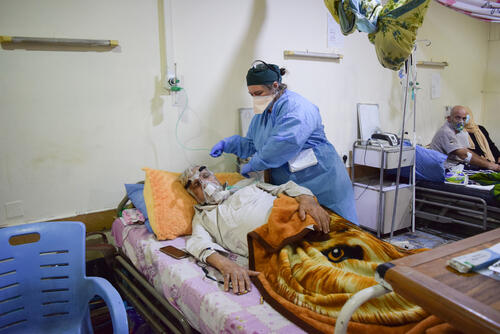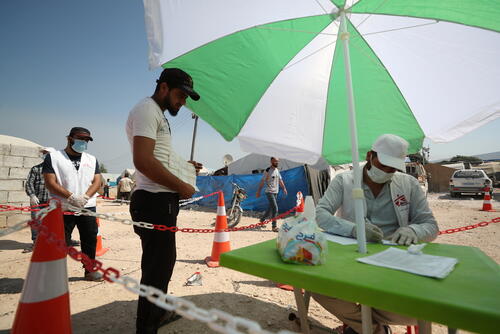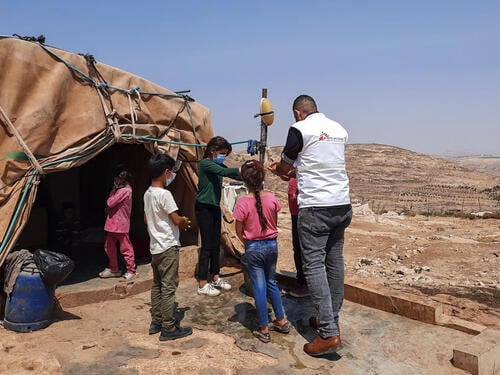Médecins Sans Frontières (MSF) has been working to respond to the coronavirus COVID-19 pandemic recently declared in Côte d'Ivoire.
Passenger screening for COVID-19 and hygiene measures set up in Abidjan
While Côte d'Ivoire is now registering 80 cases (as of 26 March, according to WHO) of COVID-19 and has not yet reached the stage of local transmission, the Ivorian authorities have quickly taken measures to restrict movement, as have most neighbouring countries.
With the closure of borders and the reduction of flights around the world, airports have become points of increased surveillance in recent days to contain the influx of new cases. In Abidjan, Côte d'Ivoire’s capital, MSF supported the Ministry of Health in a transit centre by screening and referring people with coronavirus symptoms to the care centre.
Over four days, an MSF doctor and two nurses examined more than 800 passengers from Europe, Asia and the USA to identify those who might have coronavirus symptoms. The team also set up a hygiene system and informed passengers about the need for self-confinement and the measures to be adopted at home in order to limit the risk of transmission to others.
We are concerned about the measures that are being taken in West African countries and the potentially negative consequences they will have on people.
Training for staff and water and sanitation activities in Bouaké
MSF teams are also present in Bouaké, the country's second largest city, to assess the capacity to manage cases should coronavirus break out in this part of the country, while some suspected cases have already been tested in the past days. Training activities for health workers and screening at the different entry points of the city are already on-going.
Water and sanitation activities are also being implemented: hand-washing points have been set up in six health centres as well as in the university hospital centre, in order establish the necessary barrier measures to contain an epidemic, particularly in medical facilities. In the coming days, a hospitalization capacity of 10 beds will be developed for the care of potential patients.
“Bouaké is located on the northern road that connects to the border of Burkina Faso and Mali. With the current evolution of the situation in Burkina Faso, it is essential to ensure a presence there to be able to react fast if a case is confirmed and quickly cut the chain of transmission,” says Abdoul-Aziz Mohamed, Executive Director for MSF West and Central Africa. “To do this, it is necessary to prepare for the management of cases, to ensure the protection of health personnel, but also and above all, to invest in raising awareness among people.”
A series of training sessions for health workers is also planned in Bouaké and Abidjan to train medical staff on preventive measures and case management.
What are MSF's priorities today in the COVID-19 response?
In Côte d'Ivoire as elsewhere, the availability of tests is a major obstacle to a rapid response. It’s therefore essential to raise awareness among people about the basic rules of hygiene to be respected and the necessary measures to be put in place to create barriers to transmission.
Across countries in the region, governments are taking a series of measures to stop the spread of the pandemic, including closing aerial and land borders, banning gatherings, closing schools and placing affected towns in quarantine.
“We are concerned about the measures that are being taken in West African countries and the potentially negative consequences they will have on people,” says Mohamed. “While we understand that these measures are essential today to help stop the spread of the new coronavirus, in the long term they are likely to exacerbate the difficulties of access to health services for people who are already vulnerable.”
“These measures will also reduce the capacity of health structures to respond to the already numerous killer diseases in the region, particularly due to the lack of pharmaceutical supplies, since more than half of the continent's supplies are imported”, continues Mohamed.
Over the past few days, MSF's priority has been to keep activities running in the countries where we work and to coordinate with the local health authorities to offer support in disease prevention and treatment of people with COVID-19.
Elsewhere in West Africa, MSF is in discussion with health authorities and the World Health Organization (WHO) to support the response, notably in Senegal and Burkina Faso, as in some countries in the region, the COVID-19 pandemic risks exacerbating the health and humanitarian situation in contexts already shaken by armed conflict and the displacement of people.





